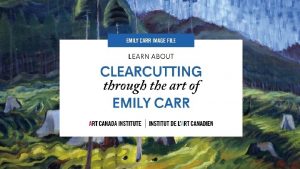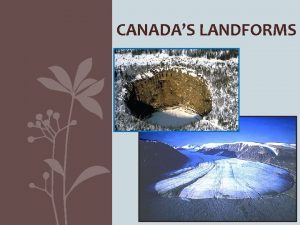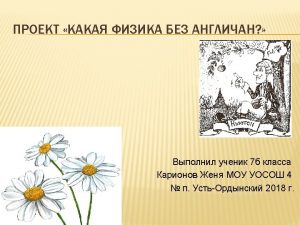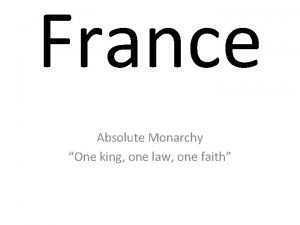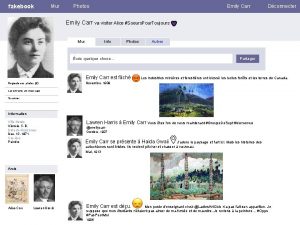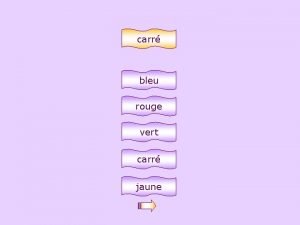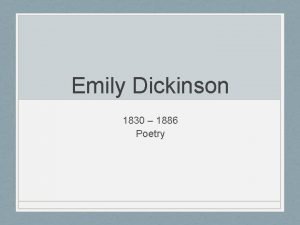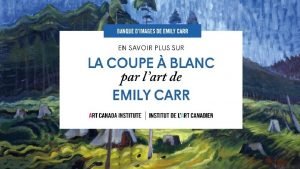Emily Carr is one of Canadas greatest and





















- Slides: 21

Emily Carr is one of Canada's greatest and most loved artists. Feeling a spiritual connection with her subjects, Emily Carr painted both the landscape and native villages of Western Canada in a unique and modern style that was rejected during its time of production. After years of travel throughout the forests of British Columbia, failing health caused her to remain close to home where she wrote seven books based on her life. Today Emily Carr is highly regarded throughout the world and considered a national icon in Canada. Through reading her books and the study of her paintings ( in poster form, or original ) one is able to grasp just how incredible this woman was.

Video https: //www. nfb. ca/film/i_can_make_art_lik e_emily_carr

About Emily Carr was born in Victoria in 1871 to prosperous parents, both of whom died when she was young. She was brought up by her family and at the age of 16 was forced to make a living from teaching, as it was felt that her desire to attend art school in San Francisco was "unladylike".

Ladylike or not, two of her paintings have been reproduced on Canadian stamps, showing her characteristic strong brush stokes and dark colours, which style she developed when studying in Paris 1910 -1911. To the best of my knowledge these two stamps are the only Carr-issues world wide.

It wasn't until 1899, when she accompanied a churchman to his mission at Ucluelet on the west coast of Vancouver Island, that her career as an artist took a pivotal turn. The life and arts of the First Nations village had a profound effect on Carr, and, inspired by what she saw, she began using both the landscape and First Nations people as her subject matter. She soon realized, however, that she needed to learn technique, so she went to London to study landscape painting.

"Totem Walk at Sitka"



Emily Carr grew up in a strict household in Victoria, B. C. , where her English parents had settled. Orphaned in her early teens, she managed to convince her guardians to let her study art in San Francisco at the California School of Design. During her later studies in England France she began to develop a distinctive style of painting that produced bold and colourful canvases that would eventually make her a Canadian icon.


But Emily Carr's journey of selfdiscovery was a painful one. Unable to support herself through her art, she focused on managing an apartment house in Victoria for 15 years. It wasn't until 1927 that Emily Carr came to the attention of the National Gallery of Canada in Ottawa, and was welcomed by the Group of Seven painters when she exhibited some of her work. Renewed by the contact with these talented artists, Emily Carr began to paint vivid pictures of the natural world and West Coast native peoples. It was only near the end of her life that Emily Carr began to be recognized as an exceptional painter as well as a writer. Her first book, Klee Wyck, won a Governor General's Award. Her paintings now hang in galleries across Canada and the fascinating life of Emily Carr is celebrated in a multitude of books and films.




Did you know. . . At age 41, Emily Carr needed to earn extra money, she raised and sold sheep dogs, hooked rugs, and created pottery based on Native designs.



Emily Carr style Paintings



EMILY CARR'S TREES • • • • • • Grade: K-2 Age: 4 -6 Submitted by: Lily Erlic, a children's writer from Victoria BC, Canada Objectives To learn about Flowing Lines and Form What You Need: Paper Brown and Green Paint brush What You Do: Ask the children what words they think of when you say "Forest". Write down the words on the chalkboard. Show the Children Emily Carr's Paintings of her trees. Go to http: //www. emilycarr. com/ Next, give each child a piece of paper. Ask the children to draw a trunk of a tree. Now ask them to draw the branches with the green paint. Ask the children about the lines in their painting. Are the lines strong, bold, thin or thick? Did Emily Carr draw real trees? Do her trees look hazy or dreamlike? Create a Discussion. Artist Biography From Emily. Carr. com "Emily Carr is one of Canada's greatest and most loved artists. Feeling a spiritual connection with her subjects, Emily Carr painted both the landscape and native villages of Western Canada in a unique and modern style that was rejected during its time of production. "
 Emily carr secondary school library
Emily carr secondary school library Emily carr scorned as timber
Emily carr scorned as timber Ecss school
Ecss school Temperatura cima teide
Temperatura cima teide Canadas landforms
Canadas landforms Canadas physical geography
Canadas physical geography Whats canadas longest river
Whats canadas longest river Unit 5 food national geographic
Unit 5 food national geographic Canadas head of state
Canadas head of state What is canadas economic system
What is canadas economic system Iespm granada
Iespm granada Canadas physical regions
Canadas physical regions Canadas climate
Canadas climate One face one voice one habit and two persons
One face one voice one habit and two persons Isaac newton one of the greatest
Isaac newton one of the greatest Isaac newton is one of the greatest
Isaac newton is one of the greatest Isaac newton one of the greatest scientists
Isaac newton one of the greatest scientists One god one empire one religion
One god one empire one religion One one one little puppy run
One one one little puppy run One king one law one faith
One king one law one faith One empire one god one emperor
One empire one god one emperor One ford behaviors
One ford behaviors

